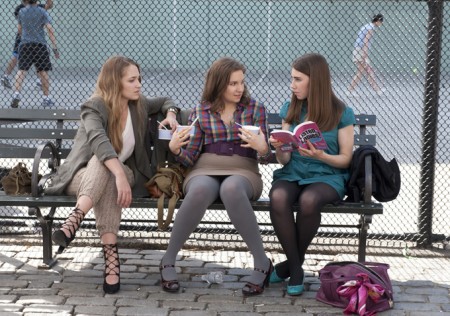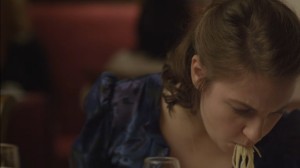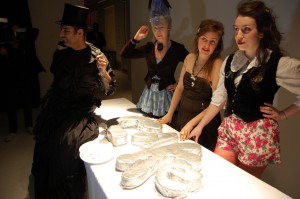The Girl Done Good
by Zoë ApostolidesWhen Sex and the City burst onto the 90s screen I was oblivious, being a mere slip of a lass still dancing round the living room to The Spice Girls, singing ‘if you wanna be my lover, you gotta get rid of my friends’. Even if I had been allowed to watch it, the chances are that Girl Power or some book about victimised farmyard animals would have seemed more pressing. Mine is the generation who latched on after the event, and pretended to mourn the show’s final episode in 2004 when really we were still grappling with Series 2 and History coursework.
Around thirteen, when we managed to get our mits on some charity-shop boxsets, we’d spend stunned evenings glued to the TV. Here were actual people having some actual sex, hurrah! Cries of ‘rewind!’ abounded, ‘wait, wait, go back to that bit – what’s she doing there? Who’s hand is that?’ to be swiftly replaced by mortified sniggering and ‘Oh my God… oh my God.’ We were deluded by our sitcom diet which – whilst undeniably cracking good fun – told us that one day we’d shed the braces, the unflattering netball skirts, the dorky lunchboxes and become goddesses with devastatingly gorgeous men à la carte and an endless disposable income.
The problem, then, with the SATC gals is that for all their poise and sophistication they were in their thirties and forties when we met them. They were like a ready-meal, held in airtight, immovable packaging and all pre-prepared. They had proper ‘jobes’, nay careers, apartments, good bad and ugly breakups. They were long out of college, they knew some stuff, they’d been around the block – albeit with champagne in a swanky limo.
 Twenty-six year-old Lena Dunham has created the antidote to these representations in the form of Girls, HBO’s new series about the life and times of four pals in New York, trying to navigate through the job market, friendships, men, and ‘making one mistake at a time’. Dunham wrote and stars in the show, which was aired in the UK for the first time last week, and has been praised here and over the pond for its realism and earthy, all-bums-bared representation of the modern young woman. Considering such whirlwind success it’s no surprise that a SATC prequel (shudder) has recently been announced, which will presumably attempt to show how Little Carrie Bradshaw got to where she did (a mixture of intense self-absorption, looking quizzical, and writing ‘I got to wondering…’). We’ll see about that, but in the meantime there’s a very Marmite-y new girl in town. The script is dark, sharp and sticky with a serious aftertaste: you’ll either love it or you’ll hate it.
Twenty-six year-old Lena Dunham has created the antidote to these representations in the form of Girls, HBO’s new series about the life and times of four pals in New York, trying to navigate through the job market, friendships, men, and ‘making one mistake at a time’. Dunham wrote and stars in the show, which was aired in the UK for the first time last week, and has been praised here and over the pond for its realism and earthy, all-bums-bared representation of the modern young woman. Considering such whirlwind success it’s no surprise that a SATC prequel (shudder) has recently been announced, which will presumably attempt to show how Little Carrie Bradshaw got to where she did (a mixture of intense self-absorption, looking quizzical, and writing ‘I got to wondering…’). We’ll see about that, but in the meantime there’s a very Marmite-y new girl in town. The script is dark, sharp and sticky with a serious aftertaste: you’ll either love it or you’ll hate it.
Our first glimpse of Dunham’s character, Hannah Hovarth, sees her stuffing great strings of spaghetti into her mouth. She’s watched by wryly indulgent parents, who are about to cut her off financially, two scot-free years after graduation during which she’s worked as an unpaid intern in a publishing house. It all sounds very Jane Austen: poor single woman alone in city of vice, with no money and no prospects, no spatial awareness and no decent sex (‘So good. That was really good. I almost came’). We love her even before she takes poppy tea and tells us she’s the voice of her generation – ‘or at least, a generation’. Trying to write her novel proves harder than predicted, because Hannah’s not sure what she wants to write about, or indeed whether she can write at all. She’s surrounded by the competing voices of three main girlfriends: Marnie, the serious art gallery receptionist with a limpet boyfriend; Shoshanna, the embarrassed virgin; and Jessa, her fantastically sardonic British cousin, who’s not even on Facebook and misses her abortion appointment because ‘these things never start on time. I’ll have a White Russian’. (‘That is so rude,’ says Marnie, ‘there is seriously nothing flakier in this world than not showing up for your own abortion.’) Wonderfully varied as they are, they fight and jostle for Hannah’s attention, and have different influences over her at different times, yet when she looks at them together, ‘a Coldplay song plays in my heart.’
 We Brits are used to introverted, hyper self-aware and self-parodic characters in comedy (cf. Peep Show), so Girls shouldn’t be a shock. Dunham’s writing is deliberately unglamorous and painfully identifiable: interior paranoias are revealed through extended internet search histories – ‘diseases that come from no condom for one second’ – and Hannah’s verbal diarrhoea as she lies with legs akimbo for an STD test:
We Brits are used to introverted, hyper self-aware and self-parodic characters in comedy (cf. Peep Show), so Girls shouldn’t be a shock. Dunham’s writing is deliberately unglamorous and painfully identifiable: interior paranoias are revealed through extended internet search histories – ‘diseases that come from no condom for one second’ – and Hannah’s verbal diarrhoea as she lies with legs akimbo for an STD test:
“The thing is that, these days if you are diagnosed with AIDS, it’s actually not a death sentence. There are so many good drugs and people live a long time. Also, if you have AIDS, there’s a lot of stuff people aren’t going to bother you about. Like, for example, no one is going to call you on the phone and say ‘Did you get a job?’ or ‘Did you pay your rent?,’ or ‘Are you taking an HTML course yet?’ because all they’re going to say is ‘Congratulations on not being dead.’ You know, it’s also a really good excuse to be mad at a guy. It’s not just something dumb like, ‘You didn’t text me back,’ it’s like ‘You gave me AIDS. So deal with that. Forever.’ Maybe I’m actually not scared of AIDS. Maybe I thought I was scared of AIDS, but really what I am is… wanting AIDS.”
The one issue – if indeed it is an issue – is that Girls isn’t speaking for the masses: it truly is of its own, and no one else’s generation, and so might exclude some viewers (those who find the above offensive, for instance). Those for whom they do speak, however, will find they’ve whacked the nail quite uncannily on the head. They’re young, over-educated but directionless: it doesn’t always resonate, but neither did SATC, something that never dampened its popularity.
So if, as Simone de Beauvoir claimed, one is not born a woman but becomes one, this show is testament to a great, messy journey: intense and awkward and gory and above all fun, maybe even more fun than the dreaded savvy stage which comes after it. These are people in that foggy, post-pubescent, post-graduation cluelessness, trying hard to look the part but quite enjoying not quite fitting into it. There’s not a Manolo Blahnik in sight and no hipster brunch dates when all anyone eats is ‘sliced seasonal fruits’. (My sister and I have a mean and probably not very funny habit of pretending to vomit on each other whenever anyone on SATC eats pizza or cake or chocolate.) Instead Hannah shares cupcakes in a tepid bath, naked in all her un-Hollywood glory, and it’s perfectly normal to have a serious DMC whilst your friend’s taking a dump: perhaps those intimacies of female friendship some men – the boyfriends in Girls included – find so hard to swallow. Remember Avenue Q (that Muppet musical)? There’s a rather jaunty song whose lines best describe what the show’s trying to achieve:
 What do you do with a B.A. in English,
What do you do with a B.A. in English,
What is my life going to be?
Four years of college and plenty of knowledge,
Have earned me this useless degree.
I can’t pay the bills yet,
Cause I have no skills yet,
The world is a big scary place.
But somehow I can’t shake
The feeling I might make
A difference
To the human race.
With these and other questions constantly buzzing round her mind, it’s a miracle Dunham wrote anything at all: and when she gets it right, it hits oh-so-close to home.
Girls: Mondays at 10pm on Sky Atlantic.

